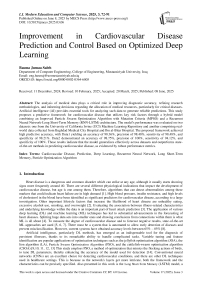Improvement in Cardiovascular Disease Prediction and Control Based on Optimized Deep Learning
Автор: Basma Jumaa Saleh
Журнал: International Journal of Modern Education and Computer Science @ijmecs
Статья в выпуске: 3 vol.17, 2025 года.
Бесплатный доступ
The analysis of medical data plays a critical role in improving diagnostic accuracy, refining research methodologies, and informing decisions regarding the allocation of medical resources, particularly for critical diseases. Artificial intelligence (AI) provides essential tools for analyzing such data to generate reliable predictions. This study proposes a predictive framework for cardiovascular disease that utilizes key risk factors through a hybrid model combining an Improved Particle Swarm Optimization Algorithm with Mutation Criteria (MPSO) and a Recurrent Neural Network-Long Short-Term Memory (RNN-LSTM) architecture. The model's performance was evaluated on two datasets: one from the University of California Irvine (UCI) Machine Learning Repository and another comprising real-world data collected from Baghdad Medical City Hospital and Ibn al-Bitar Hospital. The proposed framework achieved high predictive accuracy, with Data1 yielding an accuracy of 98.36%, precision of 98.48%, sensitivity of 98.48%, and specificity of 98.21%. Data2 demonstrated an accuracy of 98.75%, precision of 100%, sensitivity of 94.12%, and specificity of 100%. These results indicate that the model generalizes effectively across datasets and outperforms state-of-the-art methods in predicting cardiovascular disease, as evidenced by robust performance metrics.
Cardiovascular Disease, Prediction, Deep Learning, Recurrent Neural Network, Long Short-Term Memory, Particle Optimization Algorithm
Короткий адрес: https://sciup.org/15019766
IDR: 15019766 | DOI: 10.5815/ijmecs.2025.03.06


